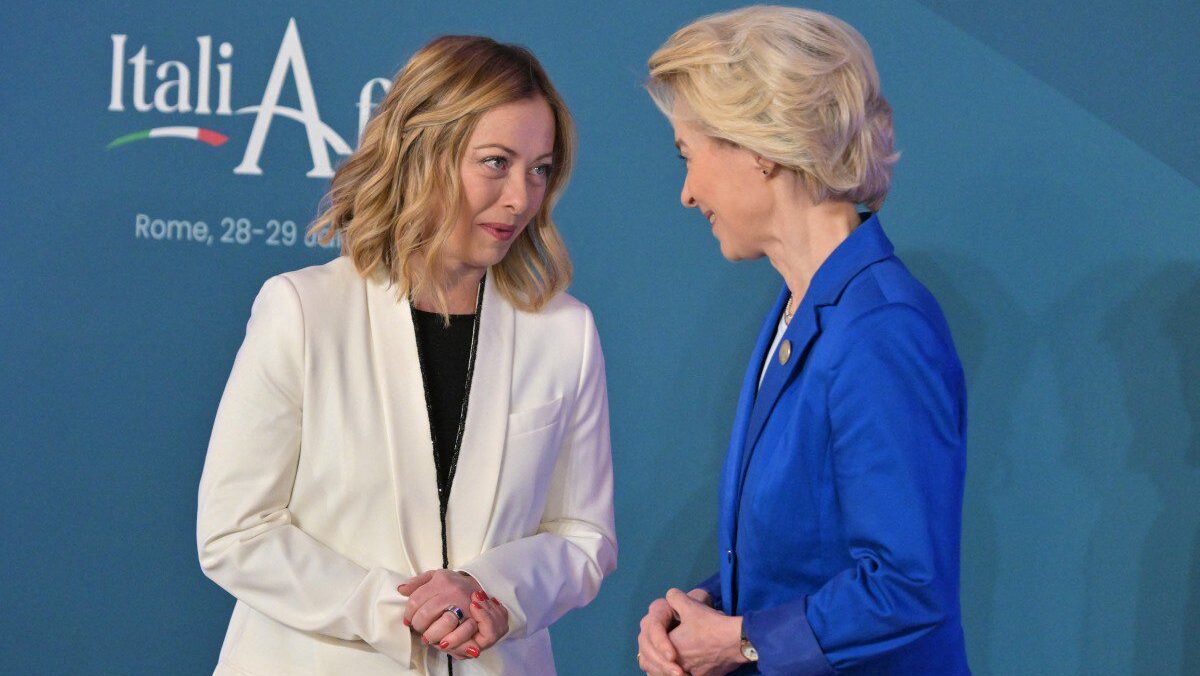
EU Commission President Ursula von der Leyen (right) with Italian PM Giorgia Meloni, whose Fratelli d’Italia party is a member of the ECR.
Photo: Andreas Solaro / AFP
After officially announcing her bid for a second term at the helm of the EU Commission earlier this week, Ursula von der Leyen has already switched to campaign mode and begun courting MEPs from outside the center-left coalition that confirmed her presidency 5 years ago as polls show their support might not be enough this time.
In 2019, von der Leyen only barely got enough votes from the European Parliament to confirm her as the Commission president, despite the coalition behind her—the center-right EPP, the socialist (S&D), and the liberal Renew—enjoying a much more comfortable majority than it can hope for this time.
This means the Commission chief badly needs the support of at least a few parties from the green or the two conservative blocs to make up for any possible deserters. However, the Greens are rapidly falling out with von der Leyen as she appears to roll back several environmental policies in the wake of the continent-wide farmers’ protests. Therefore, her attention has naturally shifted to the conservatives, who (unlike the Greens) will become an unavoidable force in the next Parliament.
Talking to reporters on Wednesday, February 21st, von der Leyen hinted at being open to working with right-wing parties in the ECR—the European Conservative and Reformist group—after the EU elections in June. But not all of them, she added.
“The cut-off line is ‘do you stand for democracy?’, ‘do you defend our values?’, ‘are you very firm in the rule of law?’, ‘are you supporting Ukraine’ and ‘are you fighting against Putin’s attempt to weaken and divide Europe?’ And these answers have to be very clear,” von der Leyen said.
She didn’t specify, but she was probably hinting at ECR members like the Polish Law and Justice (PiS) with its long-standing rule of law dispute with Brussels, the French Reconquête which believes sending endless arms deliveries only escalates the war in Ukraine, or the Hungarian Fidesz that’s set to join ECR after the election and which is ‘guilty’ on both counts.
When talking about the right-wing parties in the European Parliament, von der Leyen divided them into two main categories. “Those who are defending democracy against the Eurosceptics, and those who are defending our values against Putin’s friends, these are the ones with which I want to work.”
By branding the undesirable elements among the European right-wing parties “Eurosceptic” and “Putin’s friends,” the Commission chief also hinted that working with most of the populist Identity and Democracy (ID) group is out of the question for her.
ID members, such as Le Pen’s National Rally, the German AfD, or the Italian Lega, are often portrayed as the enemies of the European project despite their growing democratic support back in their home countries and are projected to gain the most additional seats and become the third largest bloc in the Parliament after the election.
National Rally and AfD—projected to come in first and second in the French and German races, respectively—were specifically mentioned by the EU’s foreign affairs chief, Josep Borrell recently as parties whose growing popularity is a great concern for Brussels.
“We have now polls Europe-wide which are quite worrisome, because those who are the parties who are campaigning against you, or who are the friends of Putin are getting stronger and stronger, and that is extremely worrisome for us,” Borrell said.
As for who within the ECR is ready to answer the call and throw their support behind von der Leyen remains a mystery for now. But conservatives are very much aware of their potential kingmaker status, which they might want to leverage in the following months.
